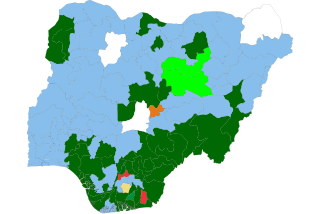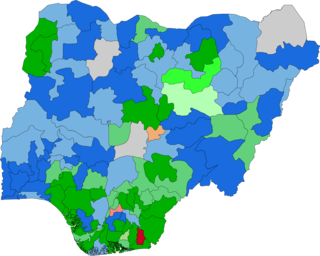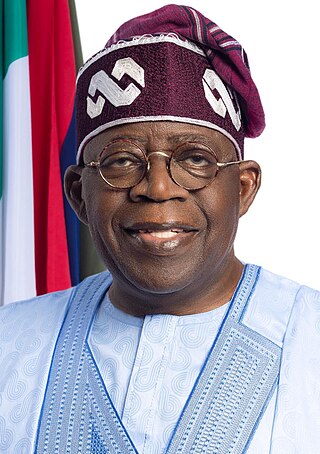
Ebonyi State is a state in the South-East geopolitical zone of Nigeria, bordered to the north and northeast by Benue State, Enugu State to the west, Cross River State to the east and southeast, and Abia State to the southwest. Named for the Abonyi (Aboine) River—a large part of which is in the state's south—Ebonyi State was formed from parts of Abia and Enugu state in 1996 and has its capital in Abakaliki.

Ogbonnaya Onu was a Nigerian politician, author and engineer. He was the first civilian governor of Abia State and was the minister of science, technology and innovation of Nigeria from November 2015 until his resignation in 2022. He was the longest serving minister of the ministry.

The table below shows the list of Nigerian senators of the 9th National Assembly. The Senate includes three senators from each of the 36 states, plus one senator for the Federal Capital Territory. The Senate president is the head of the house, and assisted by the deputy Senate president. The Senate president and his deputy also work with the principal officers in the house including the majority leader, deputy majority leader, minority leader, deputy minority leader, chief whip, deputy chief whip, minority whip and deputy minority whip.
The 2019 Kogi State gubernatorial election occurred on 16 November 2019. Incumbent APC Governor Yahaya Bello won re-election for a second term, defeating PDP Musa Wada and several minor party candidates.
The 2019 Ebonyi State gubernatorial election occurred on March 9, 2019. Incumbent PDP Governor Dave Umahi won re-election for a second term, defeating APC Sonni Ogbuoji and several minor party candidates.
The 2019 Benue State gubernatorial election occurred on March 9, 2019. Incumbent PDP Governor Samuel Ortom won re-election for a second term, defeating APC Emmanuel Jime and several minor party candidates. Samuel Ortom emerged PDP gubernatorial candidate after scoring 2,210 votes and defeating his closest rival, John Tondo, who received 475 votes. He picked Benson Abounu as his running mate. Emmanuel Jime was the APC candidate with Samuel Ode as his running mate. 3 candidates contested in the election.
The 2019 Plateau State gubernatorial election in Nigeria occurred on March 9, 2019. Incumbent APC Governor Simon Lalong won re-election for a second term, defeating PDP Jerry Useni and several minor party candidates.
The 2019 Niger State gubernatorial election occurred on March 9, 2019, in Nigeria. The APC nominee Abubakar Sani Bello won the election, defeating Umar Nasko of the PDP.
The 2019 Borno State gubernatorial election occurred on March 9, 2019, the APC nominee Babagana Umara Zulum won the election, defeating Mohammad Imam of the PDP.
The 2019 Jigawa State gubernatorial election occurred on March 9, 2019. Incumbent APC Governor Mohammed Badaru Abubakar won re-election for a second term, defeating Aminu Ibrahim Ringim of the PDP and several minor party candidates.

The 2019 Katsina State gubernatorial election occurred in Nigeria on 9 March 2019. Incumbent APC Governor Aminu Bello Masari won re-election for a second term, defeating PDP Garba Yakubu Lado and 16 other party candidates.
The 2019 Kebbi State gubernatorial election occurred in Nigeria on March 9, 2019. Incumbent APC Governor Abubakar Atiku Bagudu won re-election for a second term, defeating Isa Galaudu of the PDP.

The 2019 Yobe State gubernatorial election occurred on March 9, 2019, the APC nominee Mai Mala Buni won the election, defeating Umar Iliya Damagum of the PDP.

The 2023 Nigerian gubernatorial elections were held for state governors in 31 out of 36 Nigerian states. All but three elections were held on 18 March—concurrent with elections to every state house of assembly, three weeks after the presidential election and National Assembly elections—while the Imo State, Kogi State, and Bayelsa State elections will be held on 11 November. The last regular gubernatorial elections for all states were in 2019. All states have a two term limit for Governors which makes 18 incumbent governors ineligible for re-election.

The 2023 Benue State gubernatorial election took place on 18 March 2023, to elect the governor of Benue State, concurrent with elections to the Benue State House of Assembly as well as twenty-seven other gubernatorial elections and elections to all other state houses of assembly. The election — which was postponed from its original 11 March date — was held three weeks after the presidential election and National Assembly elections. Incumbent PDP Governor Samuel Ortom was term-limited and could not seek re-election to a third term. Hyacinth Alia — a suspended Catholic priest — gained the office for the APC by a 33% margin over PDP nominee House of Assembly Speaker Titus Uba.

The 2023 Ebonyi State gubernatorial election will take place on 18 March 2023, to elect the Governor of Ebonyi State, concurrent with elections to the Ebonyi State House of Assembly as well as twenty-seven other gubernatorial elections and elections to all other state houses of assembly. The election—which was postponed from its original 11 March date—will be held three weeks after the presidential election and National Assembly elections. Incumbent APC Governor Dave Umahi is term-limited and cannot seek re-election to a third term.

The 2023 Nigerian Senate elections were held on 25 February 2023 in all 109 senatorial districts where voters elected senators using first-past-the-post voting. The last regular senatorial elections for all districts were in 2019.
The 2023 Nigerian House of Representatives elections were held on 25 February 2023 where voters elected members of the House of Representatives using first-past-the-post voting in all 360 federal constituencies. The last regular House elections for all districts were in 2019.

The 2023 Nigerian presidential election was held on 25 February 2023 to elect the president and vice president of Nigeria. Bola Tinubu, the former governor of Lagos State and nominee of the All Progressives Congress won the election with 36.61% of the vote, just under 8.8 million votes to defeat over runners-up former vice president Atiku Abubakar and former governor of Anambra State Peter Obi. Other federal elections, including elections to the House of Representatives and the Senate, held on the same date while state elections were held on 18 March. The inauguration was held on 29 May 2023.

Francis Ogbonna Erishi Nwifuru is a Nigerian politician and lawyer who is the current governor of Ebonyi State since 2023. He previously served as speaker of the Ebonyi State House of Assembly from June 2015 to May 2023. He hails from Oferekpe Agbaja in Izzi local government area of Ebonyi State.










